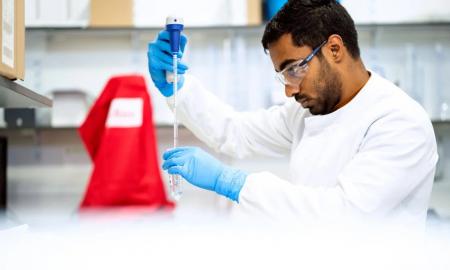Vitamin D is one of the most studied vitamins, and as such you’ve probably heard all kinds of weird and wonderful things relating to this vitamin. For example, you might already be wondering:
- What does it actually do?
- Is it really a wonder vitamin?
- How can it benefit me?
- Is it proven to increase testosterone?
The purpose of this blog is to seperate the myths from the facts – you won’t find mere opinions in this blog. You will find scientific and evidence based information, that you can actually use to quickly improve your hormones and health.

All about vitamin D
The name Vitamin D may be misleading to most as vitamin D is not actually a single vitamin,
rather it is a family of fat soluble vitamins known as secosteroids (steroids with a broken
ring); Secosteroids are a subclass of steroids, and have a steroid like structure. Due to its
structure and metabolic pathways, vitamin D has been shown to positively influence natural
testosterone. It is therefore used as an ingredient in many the of best natural testosterone boosting supplements. Classification of vitamin D appears to be somewhat of opinion as some bodies refer to it as a vitamin while others call it a hormone. Technically, vitamin D is a hormone because of its steroid like molecular structure, and because its synthesis and actions are
active in several areas of the body.
The vitamin D family includes:
- D1 (ergocalciferol with lumisterol, 1:1)
- D2 (ergocalciferol [made from ergosterol])
- D3 (cholecalciferol [made from 7-dehydrocholesterol in the skin])
- D4 (22-dihydroergocalciferol)
- D5 (sitocalciferol [made from 7-dehydrositosterol])
Although there are several different forms of vitamin D, the two most relevant to human nutrition
are vitamin D2 and particularly vitamin D3.
Functions of Vitamin D
Vitamin D plays a vital role in maintaining human health. It is largely responsible for
improving the absorption of essential minerals such as, magnesium, zinc, iron and in particular
calcium and phosphorus. Studies show that vitamin D is vital for maintaining healthy bones and
teeth due to its effects on calcium and mineral absorption, it is especially important for
maintaining normal and healthy bone development in preadolescent children.
Vitamin D also serves many other important mechanisms for supporting optimal health. World wide
studies of Vitamin D have been performed to explore its functions and effects upon various
organs, metabolic responses, and diseases such as: endocrine functions, brain and cognitive
health, inflammation, cardio vascular disease, and atherosclerosis. Its effects have been found
to be so far reaching, it has now evidenced that vitamin D is known to influence over 200 genes highlighting links to diseases.
Importance of Vitamin D on health
A deficiency of vitamin D can lead to serious health implications; Vitamin D insuffinciency has
been directly linked to diabetes, hypertension, autoimmune diseases and cancer. Severe
deficiencies may lead to diseases such as:
- Rickets
- Osteomalacia
- Asthma
Positive effects of Vitamin D on Testosterone
In men, 97% of testosterone is produced by the testes, with only 3% being produced by the
adrenal glands. Vitamin D receptors are present in the testes which suggests that vitamin D does
have some action on endogenous testosterone. Endocrinologists and other branches of science are
currently trying to understand the exact processes of how vitamin D affects and interacts with testosterone levels. Although the exact mechanism of vitamin D’s influence on testosterone is not yet fully understood, results of studies do show that there is a direct correlation between vitamin D and testosterone.
Vitamin D may reduce SHBG increasing free circulating testosterone
The majority proportion of endogenous testosterone is bound to SHBG (Sex Hormone Binding
Globulin); testosterone bound to SHBG remains unavailable to bind to androgenic receptors and
induce its anabolic effects. Essentially all testosterone bound to SHBG is dormant, having no
biological effect. Reducing SHBG increases freely “available” testosterone pools, meaning more testosterone is readily available and thus the effects of testosterone are more pronounced. Data from various human studies indicate that Vitamin D is significantly associated with total testosterone and sex hormone-binding globulin.
Best quality food sources of vitamin D
There are few foods that even contain vitamin D let alone contain it in abundance, and thus why
there is a rise in incidence of vitamin D deficiency in humans. Here is our pick of the best
food sources of vitamin D:
- Wild oily fish (non farmed)
- Butter from 100% grass fed cows
- Liver
- Egg yolks from pastured hens
Please note, farmed fish, and produce from grain fed cows do not naturally have the same vitamin
D content unless artificially fortified.
Sunlight and vitamin D3 synthesis
It is very important to note that Vitamin D3 is synthesised in the skin via exposure
to sunlight. Ultra violet rays from the sun catalyse the photochemical conversion of provitamin D3 into vitamin D3. The amount of sunlight you are exposed to can significantly affect your Vitamin D3 level. For example, depending on which part of the globe you live (Locations closer to the equator receive more sunshine and vice versa), significantly affects the amount of vitamin D3 synthesised in the skin. Lack of sunlight and natural UV rays reduces the dermal synthesis of vitamin D3. The bottom line is, if you are rarely in the sun, you need to consume vitamin D3 through your diet, or you may find you fall deficient.
Plant based vitamin D and plant sterols
It was once thought that plants didn’t contain vitamin D3, however various studies
have led to the discovery of vitamin D in plants. For example, animals grazing on specific types of plants are known to develop calcium intoxication similar to that caused by consuming too much vitamin D. Scientists believe this phenomenon to be caused by vitamin D3 or a metabolite of vitamin D3contained in the plants that stimulate calcium absorption.
The plant kingdom is estimated to have around 260,000 different species of plants, each with
their own unique properties and genetic make-up. Many species of plants contain some very
interesting phytochemicals, some of these phytochemicals are known as sterols. A sterol or
phystosterol, in chemistry, is known as a steroid alcohol. Sterols are a sub class of steroid
hormones and are structurally very similar to vitamin D; sterols are precursors of vitamin D. It
is widely thought that plants containing provitamin D3 (a precursor to vitamin
D3) are able to synthesise vitamin D3 via photochemical conversion from
exposure to UV rays from sunlight.
Nutrients are passed down the food chain
When trying to incorporate high quality dietary sources of vitamin D into your nutritional plan,
it is important to note that not all foods are equal. For example, wild salmon are free to feed
on their natural diet of squid and other smaller fish, eels, and shrimp. Wild Sockeye salmon
almost exclusively feed on plankton and as such are a great source of vitamin D.
Ultimately salmon acquire their vitamin D through phytoplankton and marine plants, whether it be
from directly eating these plants or by consuming other smaller creatures such as krill who feed
off these nutrient rich plants. Farming fish and deviating from their diet to that of low
grade, low nutrient, man made food pellets, significantly lowers the nutrient quality of the fish.
Conclusions
Vitamin D is imperative for maintaining optimal health and also for preventing disease. It is also a potent ergonomic sporting aid because of its positive influence on testosterone. High quality dietary sources of vitamin D are rare, and thus it is of great importance to regularly consume foods such as
wild salmon that are naturally high in vitamin D. Furthermore exposure to sunlight is also a contibuting factor in maintaining a healthy vitamin D level; sunlight stimulates the dermal synthesis vitamin D. We also recommend supplementing daily with 1000iu vitamin D to ensure optimum health.
This article was republished from: DNA Lean's blog






